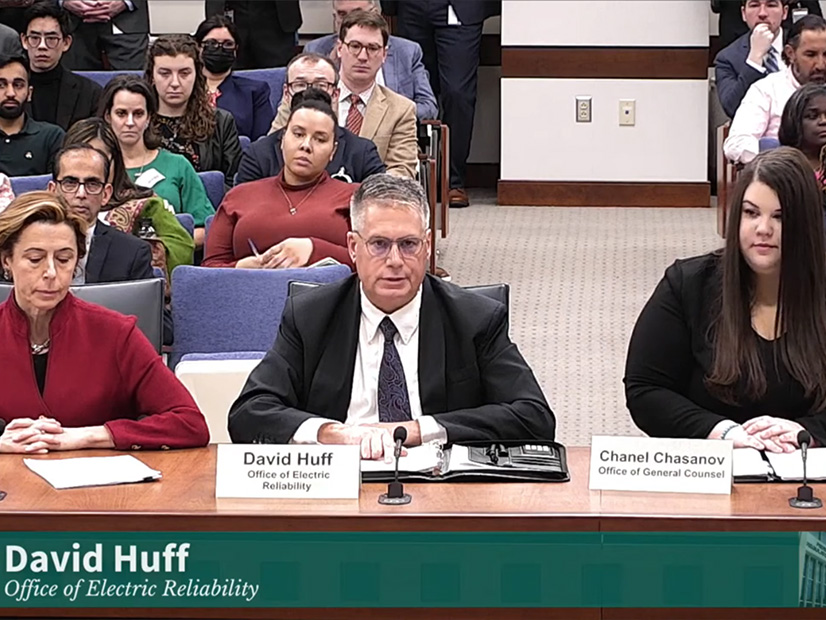
WASHINGTON — FERC on Thursday approved two new NERC reliability standards in response to the February 2021 winter storm that nearly led to the collapse of the Texas Interconnection (RD23-1).
According to FERC staff, EOP-012-1 (Extreme cold weather preparedness and operations) and EOP-011-3 (Emergency operations) implement about half of the standards-related recommendations from the commission’s joint inquiry with NERC into the Texas grid operator’s poor performance during Winter Storm Uri.
The standards require generator owners to implement several measures to prevent their units from freezing during extreme cold-weather events. These include constructing retrofits at existing units based on the “extreme cold weather temperature” where they are located, defined as the lowest 0.2 percentile of the hourly temperatures measured in December, January and February since Jan. 1, 2000.
Owners will be required to submit corrective action plans if the temperature is at or above the unit’s designated extreme and one of the following occurs:
- a forced derate of more than 10% of the total capacity of the unit, and exceeding 20 MW, for longer than four hours in duration;
- a start-up failure where the unit fails to synchronize within a specified start-up time; or
- a forced outage.
Generator owners and operators will also need to conduct annual staff training on cold weather preparedness and develop procedures to improve the coordination of load-reduction measures during an emergency.
The new standards were approved by the NERC Board of Trustees in October as part of Project 2021-07. (See NERC Board Approves New Cold Weather Standards.)
“These new standards will help to prepare our nation’s grid and our grid operators so they can provide power to consumers in the face of extreme weather,” acting FERC Chairman Willie Phillips said in a statement. “I am pleased that NERC and its regional entities acted swiftly to propose these reliability standards so that my fellow commissioners and I could move decisively and vote today to ensure the reliability and resilience of the bulk power system.”
Despite unanimous approval at FERC’s open meeting Thursday, the commission acknowledged that more work needs to be done. Project 2021-07 is only Phase 1 of a three-phase process at NERC in response to the storm, and staff noted that more proposed standards will be brought before the commission by the end of the year to address the second half of the relevant recommendations.
Standard’s Shortcomings
FERC also found EOP-12-1 to be lacking, and it directed NERC to revise it to “to clarify certain language, enhance certain standard requirements, include criteria on permissible constraints and identify the appropriate entity that would receive the generator owners’ constraint declarations under the standard,” staff said in presenting the order.
“EOP-012-1, in its current form, includes undefined terms, broad limitations, exceptions and exemptions, and prolonged compliance periods,” FERC said in its order.
Among the elements FERC required be included in the next version of the standard are a deadline for the completion of corrective action plans and a shorter grace period for generators to implement those plans and freeze-protection measures. The approved standard gives generators five years to upgrade their facilities, for example.
“Although we are giving NERC the discretion to determine what the effective date should be shortened to, we also emphasize that industry has been aware of and alerted to the need to prepare their generating units for cold weather since at least 2011,” FERC said. After the January 2018 South Central cold snap, a joint FERC-NERC report found “that one-third of the generator owners and operators surveyed ‘still had no winterization provisions after multiple recommendations on winter preparedness for generating units.’”
“NERC should consider the amount of time that industry has already had to implement freeze-protection measures when determining the appropriate implementation period,” the commission ordered.
Commissioner Allison Clements criticized EOP-012-1’s deficiencies at length during the meeting. “This is one of the more important votes we are taking during my time at the commission,” she said before recalling the deaths and economic damage Texans experienced during the 2021 storm as a result of prolonged power outages.
“There are a number of good measures in what we accept today, to be sure,” Clements said. “But the critical generator weatherization requirements as they were proposed, to be frank, are not up to the task.”
EOP-012-01 requires that existing generators be able to operate for at least one hour continuously at their designated extreme low temperature. “Yeah, one hour,” Clements said sardonically. “Needless to say that doesn’t bring total comfort that we will ensure we get through the next multiday event like Winter Storm Uri.”
She also said the amount of time allowed for implementation “does not reflect the urgency we feel.”
The commission gave NERC a year to submit the revised standard.
Although ERCOT’s markets are not subject to FERC regulations, generators in the Texas Interconnection are subject to NERC’s reliability standards. But Commissioner Mark Christie said market design was the bigger issue.
“These [standards] may have a positive impact … for generators, but … one of the problems that prompted [what happened during] Uri was the market design” in ERCOT, he said. “And I think the same issue applies in many other RTOs. It’s a much bigger issue about how these markets are structured and how they deliver the reliability that we need.”



